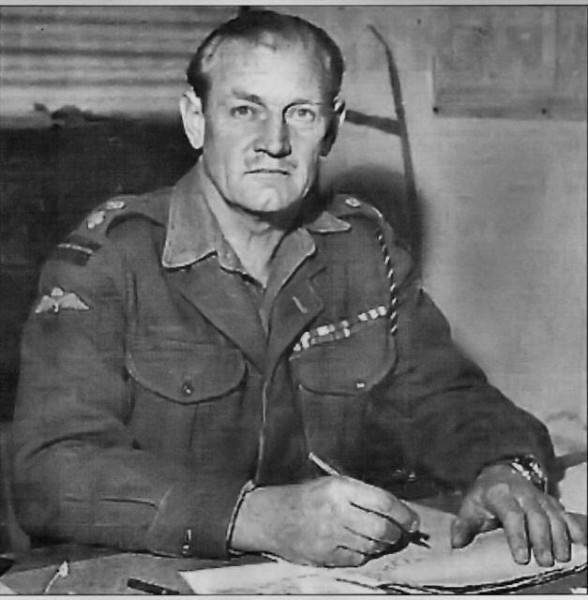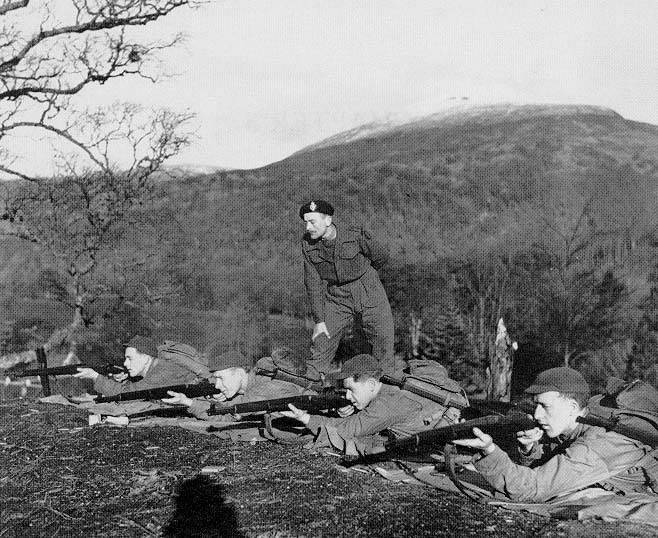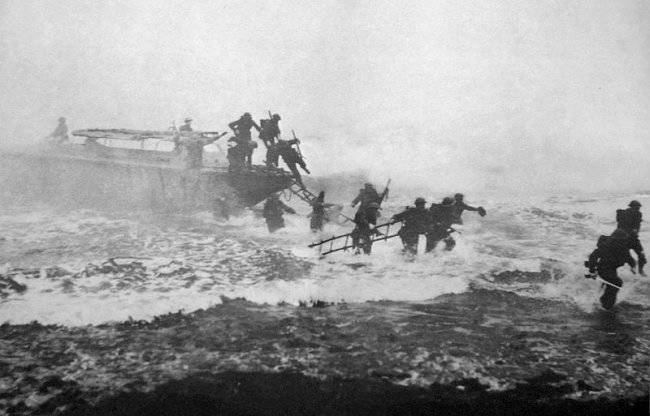"Robin Hood" on the whole head
John Malcolm Thorpe Fleming Churchill
The pages of the Second World War, full of tragedy and heroic accomplishments, know many stories about people who are on the verge of life and death, people who have fallen into difficult, and sometimes hopeless situations, and who have managed to keep up their courage and sense of humor. Such a warrior inspiring fellow soldiers and managed to get out unharmed from all the troubles that fate threw him into was Lieutenant Colonel John Malcolm Thorpe Fleming Churchill, nicknamed by his contemporaries "Mad Jack", and historians - Robin Hood of World War II. Disassemble that in numerous stories about this extraordinary person is fiction, and that, however, is almost impossible, so you have to tell stories in the form in which they reached our days, giving the reader to judge their authenticity ....

John Churchill was born in Hong Kong 16 September 1906-th year in a family of hereditary Scots who moved to the Asian city of Oxfordshire. In 1926, he completed a course of study at the Royal Military Academy in Sandhurst, after which he was assigned to serve in the Manchester Regiment in Burma, from where he retired to 1936. Military service could not re-educate this eccentric man, and even the harsh military laws did not make John an obedient warrior.
In the army, he was mainly engaged in traveling around the Indian Peninsula on his favorite motorcycle. His main and final achievement was a trip to 1500 miles from Pune to Calcutta. It should be noted that it is incredibly difficult to overcome such a distance in India on any vehicle. Numerous water barriers and the absence of tolerable roads that are usual for foreigners made such a trip not only difficult, but also extremely dangerous. But Churchill managed, showing inhuman perseverance and endurance. At the very end of this journey, John had to fight with the wild Asian buffalo, from which only Churchill himself got out alive, but not his vehicle. Perhaps, with a different outcome, he would drive his motorcycle and on the roads of World War II.
Co-workers laughed about one case in which John came to the military parade, carrying an umbrella with him, which was strictly forbidden by the rules of the British army. To the indignant question of the authorities about the reason for such unacceptable behavior, the culprit calmly replied: "Sir, but it is raining!" Of course, the authorities did not particularly complain about such a wayward and unpredictable soldier, but it is known that the higher ranks still respected Churchill, speaking of him as a person with excellent leadership qualities and a strong character.
At the same time, John learned how to play the Scottish bagpipes perfectly. Later in 1938, he finished second in the British bagpipe competition. But the main talent and passion of John at the same time was archery. The archer from him was really outstanding, in 1939, John Churchill represented Great Britain at the World Championships in Oslo on shooting from this weapons.
After entering a citizen, John got a job as an editor for a local small newspaper. He even appeared in one of the episodes of the film “The Thief of Baghdad”. Perhaps his army career would have ended if not for Hitler’s aggressive plans and the outbreak of World War II. The occupation of Poland forced him to return to the service. Fatherland urgently needed defenders, and Churchill without delay was enlisted in the ranks of the armed forces of the British Empire. John himself, modestly commenting on his return, said that he "had to put on a red uniform, because without him the country fell into serious bindings!".
Churchill became famous in the British army after a unique incident in the history of World War II, which occurred in May 1940, in a French village called Lepinette. Soldiers from the Manchester Regiment, among whom was John, came across a German patrol of five men. Imperceptibly approaching the enemy, Churchill took a bow from his back, which he dragged everywhere with him, and took out an arrow. A moment later, amazed fascists watched as one of their comrades fell to the ground with an arrow in his neck. Not allowing the enemy to come to his senses, the British attacked, destroying the rest of the Nazis.
One of the witnesses of those events said that after the battle, he saw John riding a small trophy German motorcycle, which had a German cap on its headlamp, and a bow was attached to the frame. When he drove up to the soldiers, they noticed that blood was flowing down the neck of the homegrown "Robin Hood". Catching their worried glance, Churchill, as usual, joked aside, saying that "he was too tired when he had to run away from the German machine gun."
So John got his nickname and became one of the most recognizable fighters among British military personnel. This was not surprising, because his actions were extremely extraordinary and went far beyond the behavior of an ordinary person. In addition to the bow with a full quiver of arrows, Churchill often wore bagpipes, citing this as a means to raise the spirit of the fighters, as well as the Scottish broadsword, which John considered mandatory for arming any officer and repeatedly using it on the battlefield. Stories about his exploits were passed from one soldier to another, overgrown with new details and facts.
Soon, John saved one of the wounded officers of the British troops, pulling him out of the burning tank. He also tried to take the tank itself from the battlefield, but, alas, the six trucks to which Churchill tied the combat vehicle for towing could not cope and implement his idea. For his courage and courage, he was awarded the first military award - the Military Cross.
When the recruitment of troops for the British commando units was announced, John, who thought that the name of the new unit sounds quite menacing, joined their ranks as a volunteer. And of course, he managed to distinguish himself in the very first major operation that took place at the end of 1941 on the Norwegian island of Voghsøy. His detachment was to disable the coastal batteries located on the island. As soon as the landing craft reached the shore, John, with a warlike cry and broadsword, rushed to the attack first. And when the attacking soldiers were pressed to the ground with fire, he played the Cameron March on the bagpipes, after which the British commandos launched an offensive, and the operation was successfully completed.
Churchill used a similar tactic when, in 1943, his unit was instructed to neutralize an enemy artillery company that had settled in the Italian town of Piegolella and was preventing the landing of Allied forces. Since the numerical advantage of the enemy almost excluded the possibility of winning a victory in open battle, and it was impossible to approach the city unnoticed, John came up with another adventure. He ordered his fighters to line up in long lines, run off urine and yell loudly intimidating things. The plan was successful. Fifty Britons were able to neutralize more than a hundred Germans who were confused by such an attack.
But the most interesting thing in Churchill's biography was still to come. Making his way through the night to the town occupied by the Germans along with his soldiers, he managed to capture forty-two Nazis with mortar crews. Capturing the first prisoner, John threw a strap from his revolver around his neck and led him to other posts. When the sentries heard the voice of their comrade, they lost their vigilance. At that moment, the British, led by a captain armed with a broadsword, jumped out of the darkness at them. The booty, along with the wounded, was piled up in a cart, which the rest of the captured Germans under convoy of commandos were dragged to the camp. To the question of astonished compatriots about how he managed to turn off such an operation, John replied that "the most important thing was to give orders to the Germans loudly and clearly, and they used to quickly obey, regardless of the situation, especially if you are above their rank."
The leadership highly appreciated Churchill’s success in the military campaign in Italy - he was twice awarded the Cross For Distinguished Service. In the submissions to the awards it was noted that “Lieutenant Colonel Churchill always inspired the soldiers with his magnetic strength and leadership abilities even at such moments when they were completely exhausted, which repeatedly played a decisive role in the successful outcome of the battle. His resilience and ability to calmly face the dangers became a shining example for the whole British army. ”

However, once luck still changed the brave warrior. In May, 1944, during an operation in Yugoslavia to help local partisans of Josip Broz Tito, John’s unit received an order to attack the enemy-occupied Brac island. There was no support for the army, Churchill had to lead into battle a diverse army consisting of one and a half thousand local militiamen and two commando units - Commando-40 and Commando-43. After a successful landing, the guerrillas independently decided to postpone the offensive due to a lack of weapons, and the British, who suddenly found themselves without support, had to engage in an unequal battle with the enemy. The detachments of the last special training of valiant warriors came under heavy machine gun and mortar fire and were almost completely destroyed. Only six of them, led by Churchill, managed to survive. In this case, two Britons were dying, and another was injured. The group continued to fight until two wounded and John himself survived. Seeing the hopelessness of the situation, the commander dropped the weapon and picked up the bagpipes, playing the song with the eloquent title “Will You No Come Back?” (“Will Ye No Come Back Again?”). The music sounded until a German grenade exploded nearby. The contused Churchill was taken prisoner unconscious.
How was the life of the commander of the British Special Forces among the Nazis unknown for certain. But even in such a situation, the spirit of John was not broken. It is known that he gave a note to one of the officers of the enemy, in which he “thanked him for his good treatment and invited him to have dinner with his family after the war”. At the end of the message, Churchill even indicated his phone number. What it was, a mockery or a gesture of gratitude, is not clear.
Having learned the name of "Mad Jack", the German authorities decided that he was a relative of the famous namesake and sent him to the German capital for a special interrogation. During the flight, John managed to make a small fire on board the plane, in which the frightened escorts, in order to hush up the case, blamed the smoking pilot. Having dealt with the family confusion, the Germans sent Churchill, already pretty exhausted by torture, to the Sachsenhausen concentration camp, from where in September 1944 of the year he unsuccessfully tried to escape along with a British Royal Air Force officer through a sewer pipe. They were captured just a few kilometers from the Baltic, near Rostock, and returned back. In April, about a hundred and fifty prisoners, including John, were sent to execution in Tyrol in 1945. In this city, prisoners of war had time to ask for help from the local command of the units of the Wehrmacht, which unexpectedly went to meet them and "took away" the prisoners from the SS. And in late April, Mad Jack escaped from the Austrian camp in Niederdorf again, taking advantage of the fact that the guards hesitated after accidentally turning off the lights. Churchill just went through the main gate and walked towards the Alps. Avoiding large roads and eating vegetables from local gardens, he traveled about two hundred and forty kilometers, crossed the Brenner Pass and found himself on Italian territory. On the way to Verona, John was picked up by an American military convoy.
After returning home and improving his health, Churchill reiterated his desire to fight and went to Burma, where fighting against Japan was still going on. However, on the very border with India, he was caught by a message that the Japanese had capitulated. Eyewitnesses reported that John was extremely upset by this event. But this was not the end of his military adventures. At the age of forty, John learned how to jump with a parachute and was appointed to command the Fifth Parachute Battalion, thus becoming the first officer to lead the paratroopers and commandos.
In 1946, Mad Jack, at the invitation of his front-line friend and part-time actor Robert Taylor, starred as an archer in the film Ivanhoe. And in 1948, the lieutenant colonel was transferred to Jerusalem to the post of deputy commander of the first battalion of the Scottish Light Mountain Infantry (Seaforth Highlanders regiment).
13 April 1948 year, shortly before the British were withdrawn from the region, John Churchill, returning from the show, along with twelve other soldiers, came to the aid of the medical convoy of the Gadassah Jewish hospital, which was attacked by paramilitary Arabs. Calling on the radio help from the nearest base, John, of course, could not calmly wait for her arrival. Coming out of the car right in the midst of the exchange of fire, Churchill, dressed in a kilt and taking, with all the regalia and with a black tree cane, moved straight to an escort in ambush. However, the proud Jews rejected John’s offer to evacuate them on armored personnel carriers, claiming that Hagany units would soon arrive. Seeing how hard it was for the remnants of the convoy, Churchill regrouped his few subordinates and entered into a shootout with several hundred Arabs.
Soon, heavy machinery from the British arrived at the site, and under the cover of a smoke screen, the survivors were able to retreat to a safe place. In that skirmish, only one British army soldier died, but seventy-nine Jews were killed or burned in fires, and twenty-two more were missing. After some time, "Mad Jack" again distinguished himself, already during the evacuation of the population on Mount Scopus. He managed to save about seven hundred Jews: the doctors of the local hospital, university students and patients.
Churchill was sent to Australia for further service, where John was seriously interested in surfing. The breathtaking sport was really created for him. Upon arrival in England, he became the first man to ride the board on the waves of the River Severn. Subsequently, Churchill even developed a board of his own design.
With the army, John finally said goodbye in 1959-th year, being in the rank of lieutenant colonel. After retiring, he worked as a civilian supervising the training of cadets in the Ministry of Defense. But even being retired, he continued his eccentricities. For example, returning home by train every day, Mad Jack threw all his bags out the window. The shocked passengers could not understand that he was throwing things at the moment when the train was passing by his house in order not to carry them from the station.
From a long and happy marriage with Rosamund Denny, he had two sons, Malcolm and Rodney. On weekends, the whole family organized boat trips along the Thames, and one of his favorite retirement hobbies was building models of radio-controlled ships and writings of small poems. John Churchill died in his bed on March 8 of 1996. Thus, despite his ability to constantly fall into extremely dangerous situations, John managed to calmly live with his family to 90 years. And his whole life is a wonderful example of courage, devotion and selfless service to his people.
Information sources:
-http: //tainy.info/personalia/s-mechom-na-pulemet/
-http: //vavilonu.net/esche/155-bezumnyy-dzhek.html
-http: //www.exo-ykt.ru/articles/24/283/6582/
-http: //ru.wikipedia.org/wiki/

Information